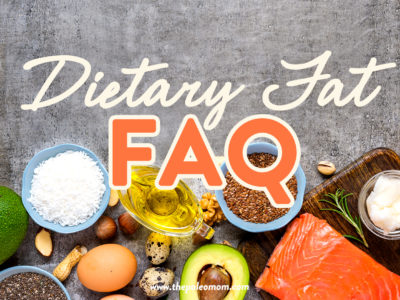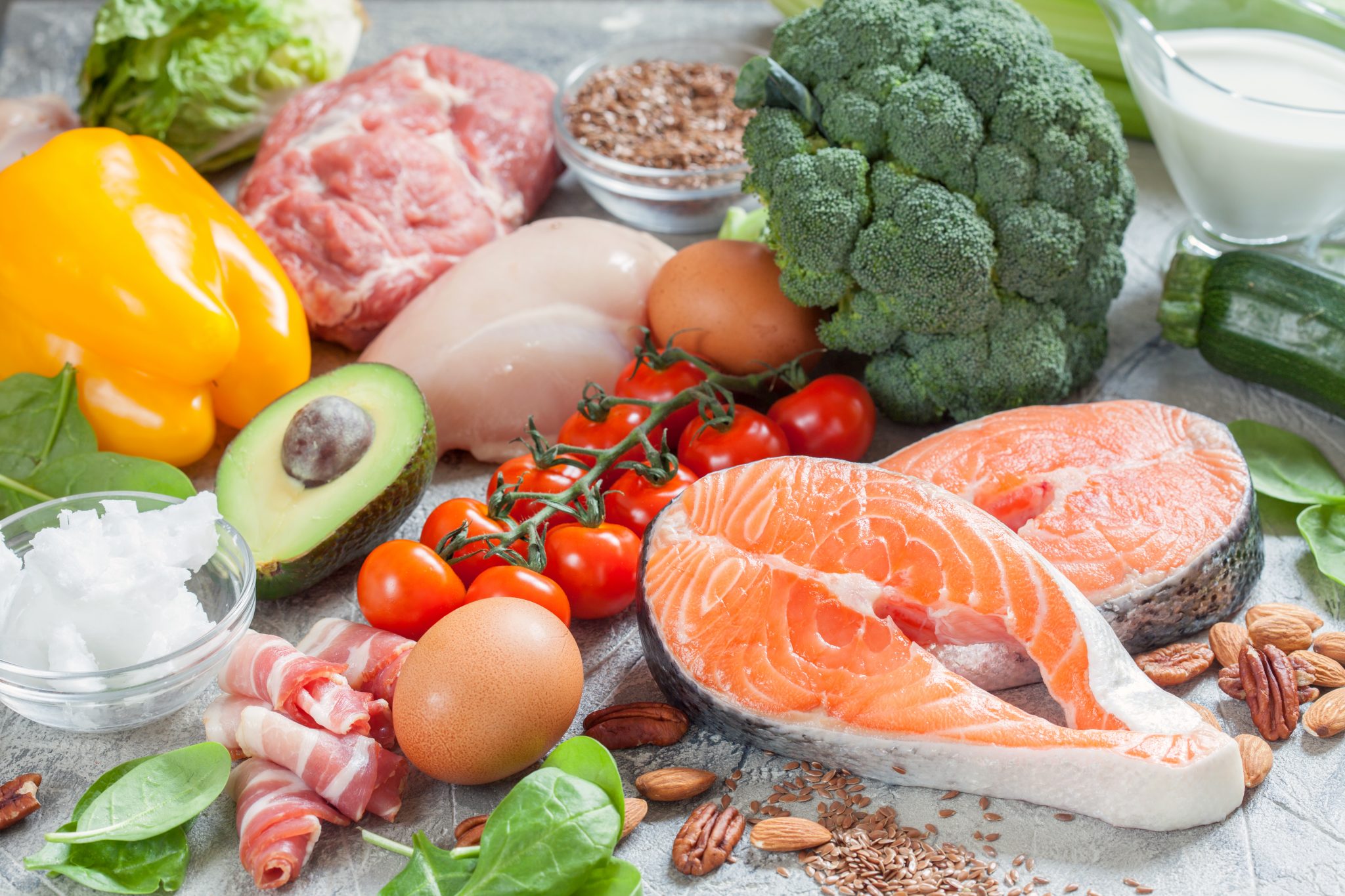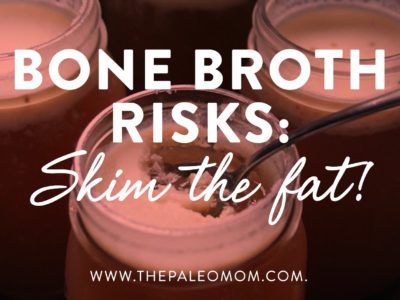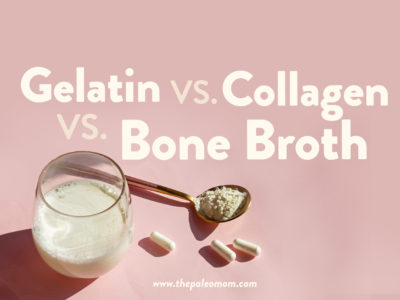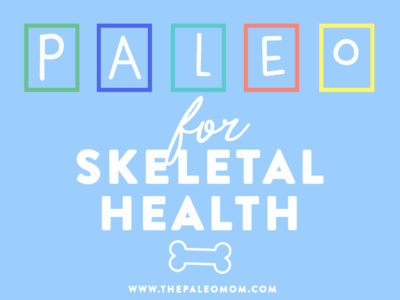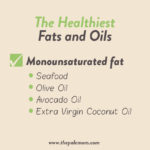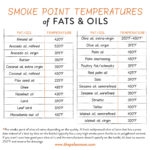How dietary fat impacts our health is related to the type of fat we’re eating as well as how much. Let’s review!
What Fats Do in the Body
Fats (or more technically, lipids) perform three primary biological functions within the body:
- they serve as structural components of cell membranes,
- they are an energy storage molecule and some can be directly used for energy,
- they function as important signaling molecules, including forming the backbone of autocrine (within a cell) and paracrine (between neighboring cells) signaling molecules as well steroid hormones and vitamin D.
Yes, lipids — including fatty acids, phospholipids and sterols like cholesterol — are essential for our health. But, when we consume too much of the wrong types of lipids, they can negatively impact out health.
Types of Fats
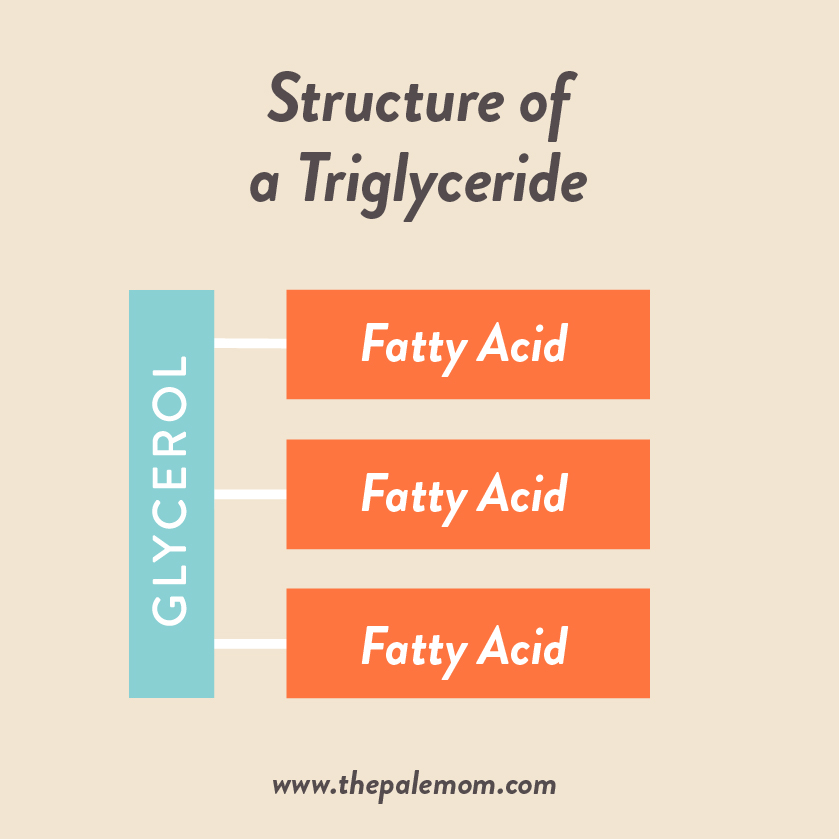 The fat we consume is predominantly made up of fatty acids in a molecule called a triglyceride, three fatty acids connected with a glycerol molecule. Fatty acids are liberated from their triglyceride structure by an enzyme called lipase, and the resulting free fatty acids can then be used for energy or, depending on the fatty acid, for other biological roles.
The fat we consume is predominantly made up of fatty acids in a molecule called a triglyceride, three fatty acids connected with a glycerol molecule. Fatty acids are liberated from their triglyceride structure by an enzyme called lipase, and the resulting free fatty acids can then be used for energy or, depending on the fatty acid, for other biological roles.
We can broadly categorize fatty acids as saturated, monounsaturated, and polyunsaturated, based on the type of molecular bond between carbon atoms in the fatty acid, with the latter being divided into omega-3 polyunsaturated fats and omega-6 polyunsaturated fats. Monounsaturated and polyunsaturated fatty acids can also be trans-fats, which refers to the orientation of double bonds between carbon atoms in the fat. These fat types are explained in more detail in:
Fats to Avoid Completely
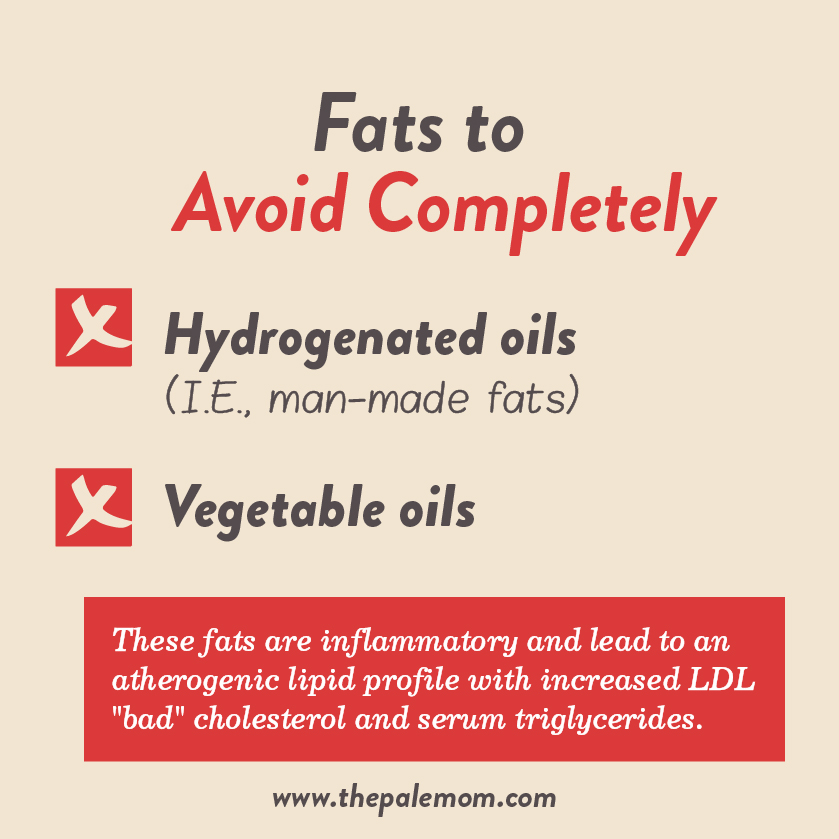 Certainly, some dietary fats are best avoided completely, including: hydrogenated oils (i.e., man-made trans fats) and vegetable oils. These fats are inflammatory and lead to an atherogenic lipid profile with increased LDL “bad” cholesterol and serum triglycerides. Read more in my detailed articles:
Certainly, some dietary fats are best avoided completely, including: hydrogenated oils (i.e., man-made trans fats) and vegetable oils. These fats are inflammatory and lead to an atherogenic lipid profile with increased LDL “bad” cholesterol and serum triglycerides. Read more in my detailed articles:
The exception is naturally-occurring trans-fats like conjugated linoleic acid, or CLA, which exhibit strong anticancer effects and may improve bone density and increase muscle mass. (As an aside, grass-fed beef is a great source of CLA and my favorite source is ButcherBox.) You can read more in my detailed article:
Fats to Moderate or Limit
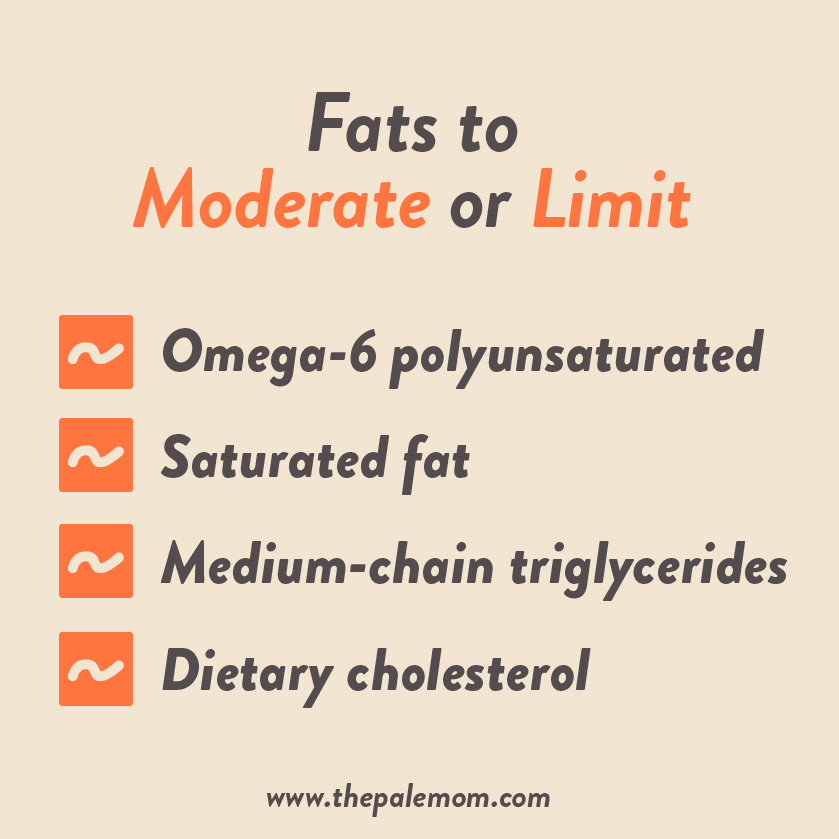 Other dietary fats are okay, but only if consumed in moderation, including omega-6 polyunsaturated fats and saturated fats.
Other dietary fats are okay, but only if consumed in moderation, including omega-6 polyunsaturated fats and saturated fats.
Nutrivore Weekly Serving Matrix
An easy-to-use and flexible weekly checklist
to help you maximize nutrient-density.
The Weekly Serving Matrix is very helpful! I’ve been eating along these lines but this really helps me know where to focus vs. which foods serve a more secondary role. It’s super helpful and has taken a lot of worry out of my meal planning. Thanks!
Jan
Saturated fat may not be the cause of heart disease as it was for so long vilified, but it does erode sleep quality, cause endotoxemia (by facilitating transport of inflammatory bacterial proteins from the gut into the blood) and cause gut dysbiosis, when consumed in higher quantities, above about 15% of total calories. You can read more in my detailed article:
But, when it comes to saturated fat, the length of the fatty acid matters a great deal. Short-chain fatty acids, like acetate and butyrate, which are produced by our gut bacteria and present in some foods, have diverse health benefits. They don’t esterify into triglycerides but instead are rapidly oxidized into acetyl-CoA, making them even the preferred fuel source for some cells. See What Is the Gut Microbiome? And Why Should We Care About It? and The Gut Health Guidebook.
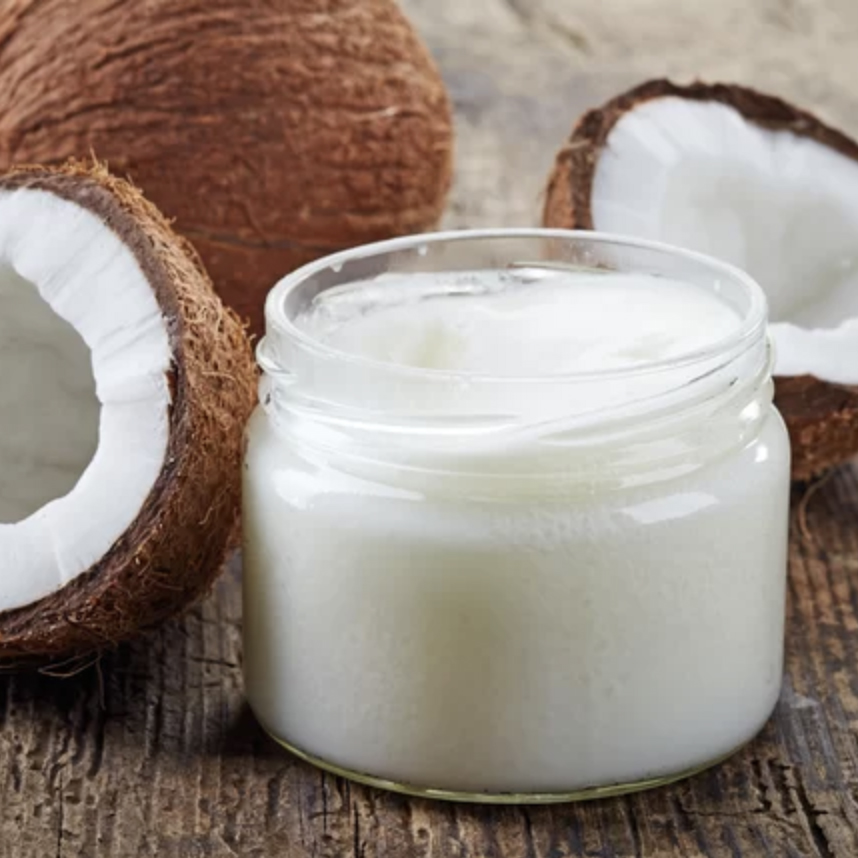 And medium-chain triglycerides, like those in coconut oil, also deliver diverse health benefits. Along with promoting fat oxidation and increasing energy expenditure, dietary MCTs have been shown to radically reduce the production of a variety of proinflammatory cytokines (meaning they reduce inflammation), increase activity of the histamine-clearing enzyme diamine oxidase (great for histamine intolerance and allergy), increase mucus production in the gut (great for gut barrier health), support gut-barrier healing (by restoring tight junction proteins to reduce intestinal permeability and by increasing cell-turnover rate in the gut), and promote a healthy gut microbiome (via selectively inhibiting pathogens). MCTs also increase the secretion of IgA antibodies in the gut (specifically in the Peyer’s patches), which is considered a marker of a robust immune system (secretory IgA deficiency is linked to increased autoimmune disease risk).
And medium-chain triglycerides, like those in coconut oil, also deliver diverse health benefits. Along with promoting fat oxidation and increasing energy expenditure, dietary MCTs have been shown to radically reduce the production of a variety of proinflammatory cytokines (meaning they reduce inflammation), increase activity of the histamine-clearing enzyme diamine oxidase (great for histamine intolerance and allergy), increase mucus production in the gut (great for gut barrier health), support gut-barrier healing (by restoring tight junction proteins to reduce intestinal permeability and by increasing cell-turnover rate in the gut), and promote a healthy gut microbiome (via selectively inhibiting pathogens). MCTs also increase the secretion of IgA antibodies in the gut (specifically in the Peyer’s patches), which is considered a marker of a robust immune system (secretory IgA deficiency is linked to increased autoimmune disease risk).
(As an aside, my favorite source for coconut oil is Tropical Traditions.) Read more in my detailed articles:
- The Health Benefits of Apple Cider Vinegar
- Coconut Oil: Any Truth to the “Pure Poison” Claims?
- The Whole View Podcast, Episode 284: Coconut: Superfood or Gut Irritant
What about dietary cholesterol? In the body, cholesterol forms the backbone of all steroid hormones and bile acids. It also has a normal, important role in maintaining cell membrane fluidity. For most people, dietary cholesterol does not increase blood cholesterol, although there are exceptions, detailed in my article:
Genetics also influence how saturated fat and dietary cholesterol affects health. In particular, people with one or two copies of the ApoE4 gene have increased cardiovascular disease and Alzheimer’s disease risk when they consume a high-fat or high-cholesterol diet Learn more in:
Omega-6 vs. Omega-3 Fats
 When it comes to omega-6 polyunsaturated fats, what’s actually important is the dietary ratio of omega-6 to omega-3 polyunsaturated fats, which ideally should be between 4:1 and 1:1. That’s because these two types of fatty acids compete for production of autocrine and paracrine signaling molecules that influence inflammation, with omega-6s being generally inflammatory and omega-3s being anti-inflammatory. In addition, omega-3s are particularly awesome for supporting a healthy and diverse gut microbiome. In fact, dietary deficiency in omega-3s (relative to omega-6s) has been linked to: dyslexia, violence, depression, anxiety, memory problems, Alzheimer’s disease, weight gain, cancer, cardiovascular disease, stroke, eczema, allergies, asthma, inflammatory diseases, arthritis, diabetes, autoimmune diseases and many others.
When it comes to omega-6 polyunsaturated fats, what’s actually important is the dietary ratio of omega-6 to omega-3 polyunsaturated fats, which ideally should be between 4:1 and 1:1. That’s because these two types of fatty acids compete for production of autocrine and paracrine signaling molecules that influence inflammation, with omega-6s being generally inflammatory and omega-3s being anti-inflammatory. In addition, omega-3s are particularly awesome for supporting a healthy and diverse gut microbiome. In fact, dietary deficiency in omega-3s (relative to omega-6s) has been linked to: dyslexia, violence, depression, anxiety, memory problems, Alzheimer’s disease, weight gain, cancer, cardiovascular disease, stroke, eczema, allergies, asthma, inflammatory diseases, arthritis, diabetes, autoimmune diseases and many others.
Omega-6s are richly found in nuts, seeds, poultry, vegetable oils, and industrially-produced meat. Omega-3s are richly found in seafood. So the key is to moderate consumption of omega-6 rich foods and intentionally choose more seafood. (As an aside, my favorite source for quality fish oil is Rosita Cod Liver Oil and ButcherBox is my go-to for sustainable seafood.) Read more in my detailed articles:
- The Importance of Fish in Our Diets
- Why Fish is Great for the Gut Microbiome
- The Whole View Podcast Episode 415: Fish oil, Healthy or not?
The Healthiest Fats and Oils
 That’s a great segue to health-promoting fats to choose. After seafood, the king of healthy fats is extra virgin olive oil, which is mainly composed of the monounsaturated fatty acid oleic acid but also contains notable amounts of vitamin E, phytosterols, carotenoids and polyphenols. Countless research studies have demonstrated olive oil to be cardioprotective, meaning that it helps to prevent cardiovascular disease by protecting the integrity of our vascular system (think healthy blood vessels) and lowering our dangerous LDL cholesterol (a marker of inflammation, too). Olive oil, especially extra-virgin, also improves gut microbiome composition, see The Gut Health Guidebook! (As an aside, my favorite source for quality olive oil is Fresh-Pressed Olive Oil Club.) Read more in my detailed articles:
That’s a great segue to health-promoting fats to choose. After seafood, the king of healthy fats is extra virgin olive oil, which is mainly composed of the monounsaturated fatty acid oleic acid but also contains notable amounts of vitamin E, phytosterols, carotenoids and polyphenols. Countless research studies have demonstrated olive oil to be cardioprotective, meaning that it helps to prevent cardiovascular disease by protecting the integrity of our vascular system (think healthy blood vessels) and lowering our dangerous LDL cholesterol (a marker of inflammation, too). Olive oil, especially extra-virgin, also improves gut microbiome composition, see The Gut Health Guidebook! (As an aside, my favorite source for quality olive oil is Fresh-Pressed Olive Oil Club.) Read more in my detailed articles:
- Olive Oil Redemption: Yes, It’s a Great Cooking Oil!
- 3 Reasons Why Olive Oil is Amazing
- The Whole View Podcast, Episode 326: The Olive Oil-cast!
- The Whole View Podcast Episode 414: Best Cooking Fats for Gut Health
Avocado oil has not been evaluated in terms of its impact on the gut microbiome, but owing to its similar fat profile to olive oil (both are very high in the heart-healthy monounsaturated fat oleic acid), vitamin content, and phenolic content, one would expect a high quality avocado oil to perform similarly to olive oil.
Extra virgin coconut oil is also beneficial as a source of MCTs, vitamin E, and phytonutrients – it has been shown to improve gut microbiome composition as well, but only extra-virgin. Refined coconut oil has been shown to unfavorably skew the gut microbiome towards an inflammatory phenotype associated with obesity. Read more in:
How Much Fat to Eat
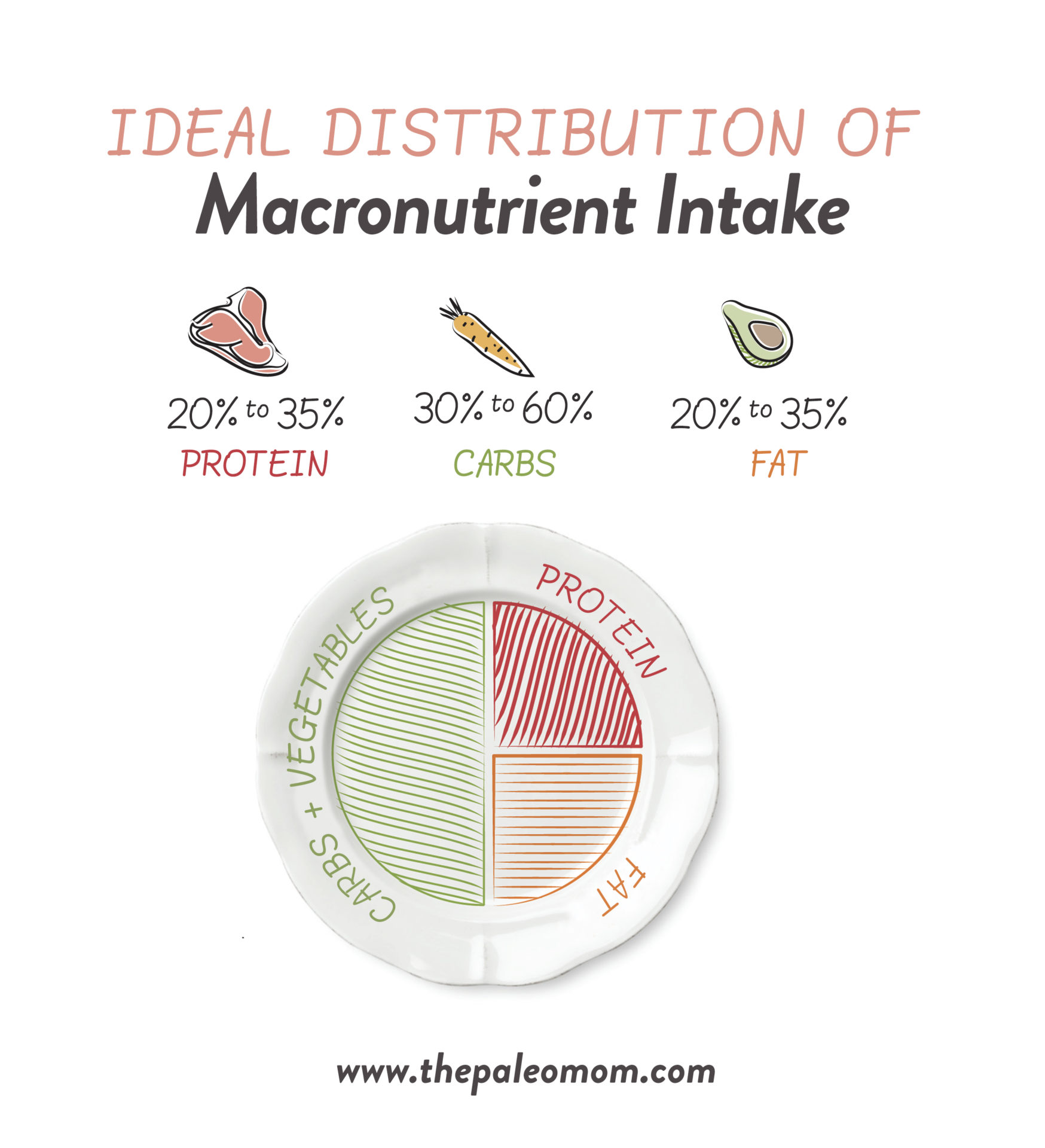 The amount of fat we eat is also relevant. The Acceptable Macronutrient Distribution Range (AMDR) for total fat consumption is estimated to be between 20% and 35% of total calories. Read more in:
The amount of fat we eat is also relevant. The Acceptable Macronutrient Distribution Range (AMDR) for total fat consumption is estimated to be between 20% and 35% of total calories. Read more in:
And, one great way to understand this AMDR is to look at how fat impacts the gut microbiome.
Different intakes of fat (as well as different ratios of fatty acids) have an impact on our gut microbiome and gut barrier integrity, subsequently affecting everything from our bodyweight to our risk of chronic disease. One study looked at over 200 strains of mice to test whether microbiome changes were more dependent on diet or on genetics, and found that high-fat diets caused similar microbiome shifts regardless of the mouse strain (on average, it took 3.5 days for each affected bacterial group to reach a new steady state after the mice’s diets were altered). High-fat diets have also been associated with a reduction in the richness of gut microflora and various composition changes at the family, genus, and species levels that increase chronic disease risk. My best resource for a deep dive into this topic is The Gut Health Guidebook, but also check out:
- The Whole View Podcast Episode 414: Best Cooking Fats for Gut Health
- How Ketogenic Diet Wreaks Havoc on Your Gut
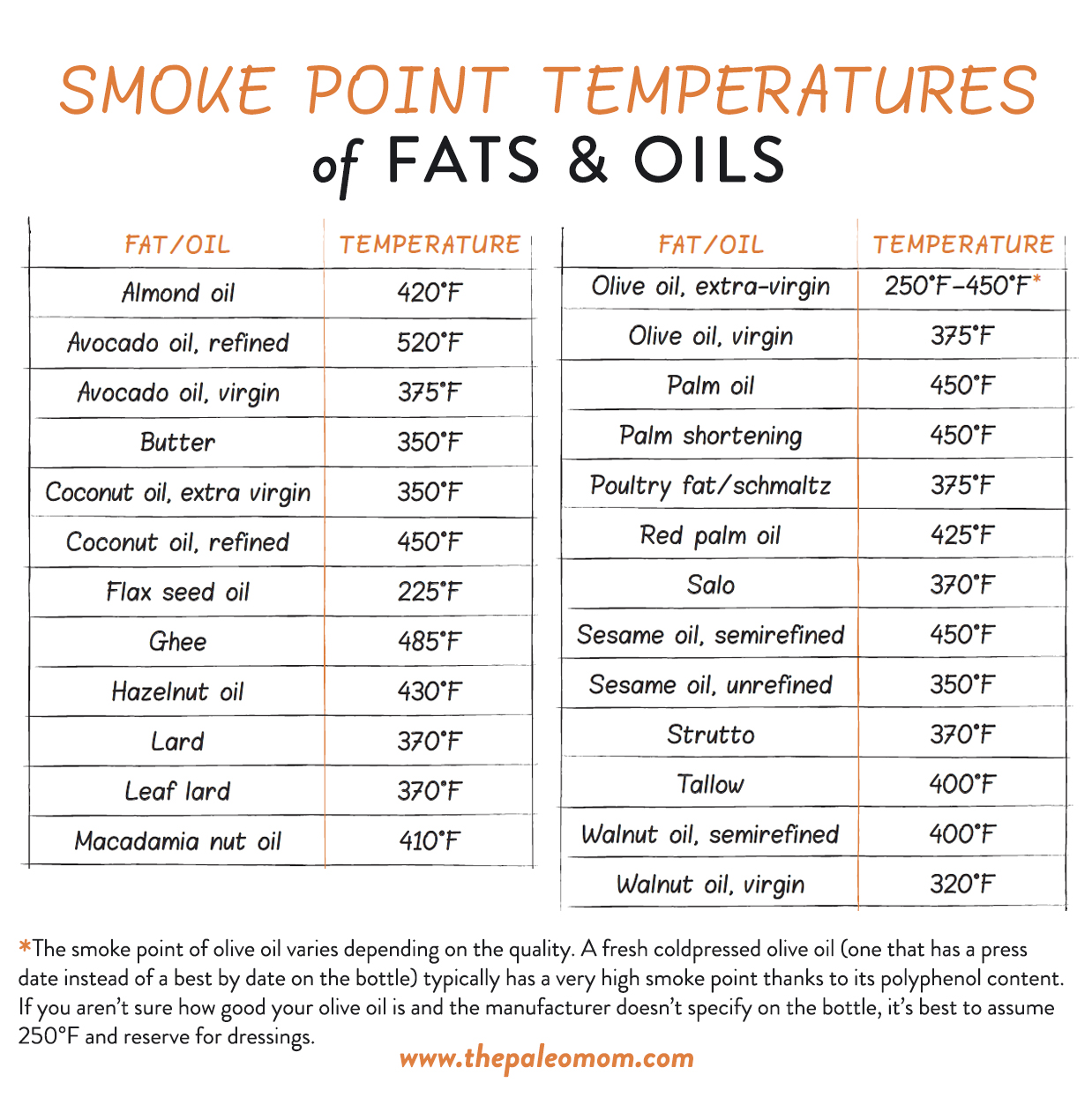 Know Your Smoke Points
Know Your Smoke Points
Finally, when cooking with fats and oils, it’s important not to heat them above their natural smoke point because doing so damages the fats and can turn even an awesome health-promoting fat into a harmful one. For smoke points and composition of common cooking and dressing fats and oils, see:
In summary, the best way to support overall health is with moderate fat consumption (20-35% of total calories) and a focus on the healthiest fats, including the omega-3s found in seafood and the monounsaturated fats dominant in extra virgin olive oil as well as some foods like avocados.

